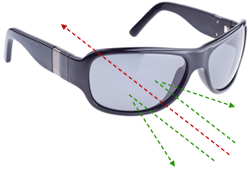As human beings, we all have a particular lens through which we view ourselves, others, and the world around us, based on our previous experiences with others, our culture, what we learned in childhood, etc. These lenses help us to react quickly and almost automatically to situations we’ve encountered before because they act as filters, allowing in certain information that triggers a response. This is what allows us to walk home from work while chatting with a friend, without having to consciously think about all the streets you have to take to get there.
| When our lenses are clear-coloured, they are helpful in allowing us to multitask. They let in all the information so we can react in a flexible manner. Anxious or depressed lenses (grey-coloured) have the effect of only allowing in information that supports our negative thoughts and feelings about ourselves, even if there is information to the contrary. |

|
For example, someone who is socially anxious may fixate on the person who is constantly checking a smartphone during her presentation and conclude that her presentation was a failure because “no one was interested.” Through this lens, she’s filtered out the loud applause and compliments she received from other attendees.
For someone who is depressed, a compliment from a coworker might be dismissed or discounted with something like, “She was just being nice, she didn’t really mean it,” whereas someone who wasn’t depressed might just thank the person and allow themselves to feel good about it.
